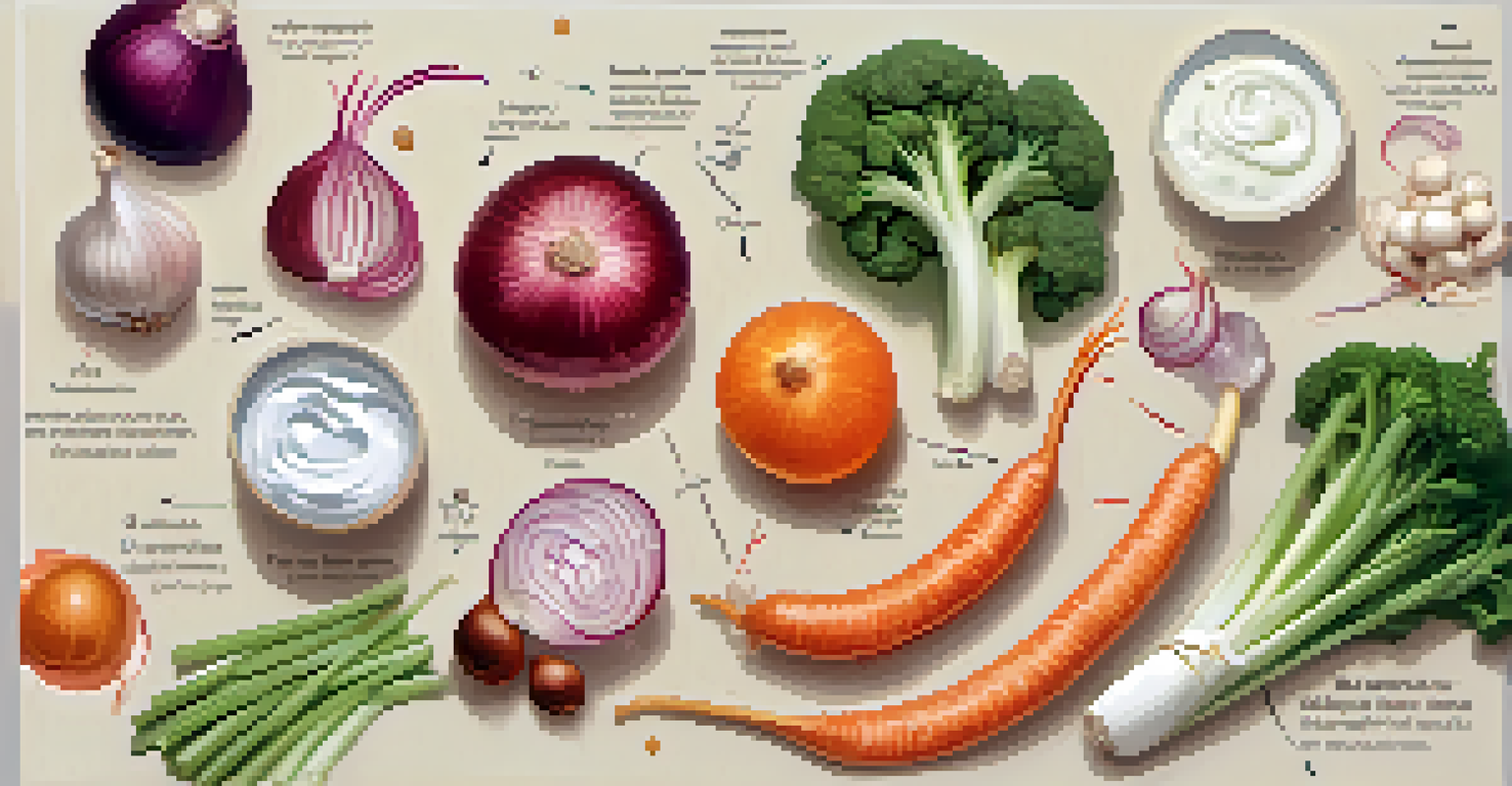Exploring the Gut Microbiome's Effect on Autoimmune Conditions

Understanding the Gut Microbiome: A Brief Overview
The gut microbiome refers to the trillions of microorganisms residing in our digestive tract. These tiny organisms play a crucial role in digestion, immunity, and overall health. Think of the microbiome as a bustling city, where beneficial bacteria are the friendly neighbors keeping everything running smoothly.
The gut microbiome is a complex ecosystem that can greatly influence our overall health and disease processes.
Recent research has shed light on the complexity of the gut microbiome and its influence on various bodily functions. It not only aids in breaking down food but also communicates with our immune system, potentially affecting how our body responds to diseases. Essentially, maintaining a healthy gut can be likened to nurturing a diverse community, where each member has a vital role.
Understanding this ecosystem is the first step in exploring its effects on autoimmune conditions, where the immune system mistakenly attacks healthy cells. As we delve deeper, we will see how imbalances in this microbiome can set the stage for these conditions.
Autoimmune Conditions: What Are They?
Autoimmune conditions occur when the immune system, which is supposed to protect us, turns against our own body. Diseases such as rheumatoid arthritis, lupus, and multiple sclerosis fall into this category. These conditions can be likened to a misfiring alarm system that mistakenly identifies the body’s own cells as intruders.

Symptoms often vary widely and can include fatigue, joint pain, skin issues, and more. This inconsistency can make diagnosis challenging, as different autoimmune diseases may present similar symptoms. It's like trying to find the source of a strange noise in a house, where various rooms may have different issues.
Gut Microbiome Affects Health
The gut microbiome plays a crucial role in digestion, immunity, and the development of autoimmune conditions.
The complexity of these diseases is further compounded by their multifactorial nature, meaning multiple factors contribute to their onset. Genetics, environmental triggers, and lifestyle choices all play a part, but the role of the gut microbiome is gaining attention as a significant player.
The Link Between Gut Health and Autoimmune Disease
Research suggests that the health of our gut microbiome can significantly influence autoimmune diseases. An imbalance in gut bacteria, known as dysbiosis, can lead to increased inflammation and a compromised immune response. Imagine your gut as a garden; when weeds (harmful bacteria) overtake the flowers (beneficial bacteria), the garden struggles to thrive.
Food is not just fuel; it is information. It talks to your DNA and tells it what to do.
Dysbiosis can trigger an immune response that mistakenly targets the body’s tissues, leading to the development of autoimmune conditions. For instance, studies have shown that individuals with conditions like rheumatoid arthritis often have a distinct gut microbiome composition compared to healthy individuals. This correlation points to the gut as a potential contributor to the disease process.
Furthermore, certain dietary habits and lifestyle choices may exacerbate dysbiosis, creating a vicious cycle. Addressing gut health could therefore be a pivotal step in preventing or managing autoimmune conditions.
Role of Inflammation in Autoimmune Conditions
Inflammation is a natural response of the immune system, but chronic inflammation can lead to serious health issues, including autoimmune diseases. When the gut microbiome is out of balance, it can trigger persistent inflammation, much like a fire that refuses to go out without intervention. This prolonged state can damage tissues and lead to autoimmune responses.
In autoimmune conditions, this inflammation can manifest in various ways, causing pain, fatigue, and organ dysfunction. The connection between gut health and inflammation highlights the importance of a balanced microbiome in maintaining overall health. It’s like ensuring that the fire in a fireplace is controlled and contained rather than raging out of control.
Inflammation Linked to Autoimmunity
Chronic inflammation, often triggered by an imbalanced gut microbiome, can lead to various autoimmune diseases.
By understanding inflammation's role, we can better appreciate the need for a healthy gut. Reducing inflammation through dietary changes and probiotics may offer a pathway to better management of these complex diseases.
Dietary Influences on Gut Microbiome and Autoimmunity
What we eat directly impacts the composition of our gut microbiome. Diets rich in fiber, fruits, and vegetables support the growth of beneficial bacteria, whereas processed foods can lead to dysbiosis. Picture your gut as a restaurant; a healthy menu attracts the right customers (good bacteria), while junk food drives them away.
Specific dietary patterns, such as the Mediterranean diet, have been associated with a healthier gut microbiome and reduced inflammation. Incorporating fermented foods, like yogurt and sauerkraut, can also introduce beneficial probiotics into our system, promoting a thriving microbiome. This shift in diet can be a simple yet powerful tool in managing autoimmune conditions.
Moreover, understanding food sensitivities and allergies can further guide dietary choices. Identifying and eliminating foods that trigger inflammation may provide relief from symptoms.
Probiotics and Prebiotics: Allies for Gut Health
Probiotics, often referred to as 'good' bacteria, can provide a boost to our gut health, while prebiotics serve as the food for these beneficial organisms. Together, they work like a dynamic duo, ensuring that the microbiome flourishes. When we consume probiotics through supplements or fermented foods, we're essentially inviting friendly guests to our gut party.
Research indicates that probiotics may play a role in reducing inflammation and modulating immune responses in individuals with autoimmune conditions. For example, certain strains of probiotics have shown promise in managing symptoms of conditions like ulcerative colitis and Crohn's disease. It’s a bit like giving the immune system a gentle nudge in the right direction.
Diet Influences Gut Health
Dietary choices, including fiber-rich foods and probiotics, significantly impact the composition of the gut microbiome and can help manage autoimmune symptoms.
Incorporating prebiotics, such as garlic and onions, into our diet can further support gut health. Together, these elements can create a balanced environment that may help alleviate some autoimmune symptoms.
Future Directions: Research and Innovations
As our understanding of the gut microbiome and autoimmune conditions evolves, so does the potential for innovative treatments. Researchers are exploring personalized microbiome therapies that could tailor interventions based on an individual’s specific gut composition. It’s akin to crafting a custom recipe that meets one’s unique dietary needs.
Moreover, advancements in technology, such as microbiome sequencing, are allowing scientists to study gut bacteria in unprecedented detail. This could lead to breakthroughs in predicting and managing autoimmune diseases more effectively. Imagine having a crystal ball that reveals not just the present state of your gut but also its future health.

As we continue to explore this intricate relationship, the hope is to develop new dietary guidelines, supplements, and treatments that harness the power of the gut microbiome in combating autoimmune conditions.